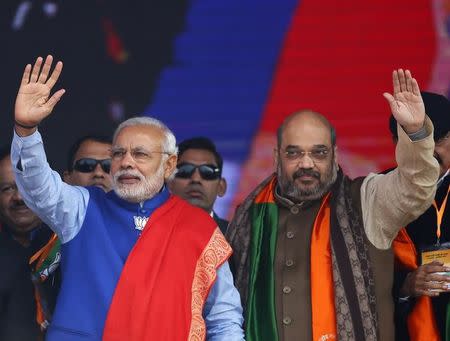India's ruling party confronts Gandhis as parliament gathers
By Douglas Busvine and Rupam Jain Nair NEW DELHI (Reuters) - Indian Prime Minister Narendra Modi has just suffered a bruising election setback, yet his party appears in no mood to compromise with the main political opposition to get stalled economic reforms back on track. Instead, the nationalist Bharatiya Janata Party (BJP) has launched an all-out offensive against the Congress party, in a potentially dangerous game of brinkmanship that risks turning the next parliamentary session into a prolonged slanging match. "It's a political vendetta," said veteran newspaper editor and commentator Shekhar Gupta of the BJP's attacks on Congress, and specifically Rahul Gandhi, heir apparent to his mother and party leader Sonia Gandhi. Yet behind the sound and fury on TV news networks may lie a more considered tactic, party strategists and political analysts said: isolate Congress while quietly persuading regional parties to back a tax reform bill that is the BJP's top priority. "We are trying to convey to everyone that the government is willing to tweak the bill and present it in a form that benefits all the states," said one senior BJP source, who did not want to be named. Sanjay Kumar, director of the CSDS think-tank and a leading opinion researcher, said: "They keep hitting the line that Congress is a dynastic party. The idea is to split the opposition." In May, 2014, Modi won India's strongest election mandate in three decades, but his dominance in the lower house is neutralized by an upper house where the BJP is in the minority. And, while he has pushed through some reforms by executive order, that solution is temporary and likely to put off foreign companies who want stable legal frameworks in place before investing in Asia's third-largest economy. One of the biggest changes Modi envisages to make the economy run more smoothly, a unified tax system, requires altering the constitution. Securing that amendment in the winter session of parliament that starts on Thursday would be vital to implementing tax reform in 2016, as Modi has repeatedly assured global investors he would. APPEARANCE OF STRENGTH The BJP's aggression may serve as cover for backroom deals that recognize the realities created by its defeat this month in the eastern state of Bihar, Modi's biggest setback as prime minister. That election result has given a sense of empowerment to regional leaders like Nitish Kumar, chief minister of Bihar, who teamed up with a local ally to rebuff Modi's challenge in the state of more than 100 million people. So, while the BJP strategist spoke of exposing rampant corruption during the decade of Congress rule that ended in May 2014, he saw no contradiction with the idea that "Modi may consider having a cup of tea with Sonia Gandhi". The two party leaders have not held face-to-face talks in this parliament since it was elected. Congress, part of the victorious Bihar alliance, sees no sign that the government wants to engage in sincere dialogue. Instead it has chided Modi for going on a series of foreign trips since the Bihar landslide and neglecting his work at home. "Where is a conciliatory attitude?" asked Anand Sharma, a senior Congress leader and interlocutor on the key tax reforms. "You have a prime minister who has a confrontational mindset, who is arrogant. He humiliates the opposition, day in and day out," Sharma told ET Now, a financial news channel. That is despite some senior aides recommending to Modi that he engages the opposition more actively, while a handful of top BJP figures have openly questioned his leadership. GST OR NOT GST Perhaps more worrying for businesses waiting with increasing frustration for the new national goods and services tax (GST), there appears to be a lack of consensus on how it would work in practice. The GST would create a single market in India for the first time since independence in 1947 and, the government estimates, boost the economy by up to two percentage points. But there is as yet no agreement on what rate the tax should be levied at; three separate committees have yet to make their final proposals. And, at a meeting of federal and state officials last week, there was no agreement on the threshold at which the tax should apply to small businesses. Finance Minister Arun Jaitley skipped that discussion to attend a film festival. Some officials express doubts over the Modi government's strategy for securing the passage of the GST amendment, saying it could miss its self-imposed deadline. "You have to go more than half the way to convince the Congress," said a senior government official involved in the policy process. "You have to be more than generous. But the BJP is still behaving as if it was in the opposition." (Additional reporting by Manoj Kumar; Writing by Douglas Busvine; Editing by Mike Collett-White)



